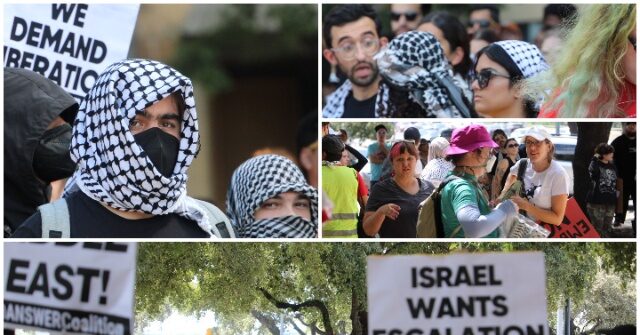In Austin, Texas, a significant protest took place just days before the first anniversary of the October 7 Hamas attack on Israel, where nearly 200 anti-Israel demonstrators gathered near City Hall. This event is part of a weeklong series of protests aimed at expressing solidarity with Palestine, Lebanon, and Iran, and the atmosphere was heavily monitored by Texas police and state troopers. The demonstrators not only displayed signs but also shouted slogans that were seen as antisemitic, particularly criticizing Israel’s military responses following the tragic attack that claimed the lives of nearly 1,200 individuals, including American citizens.
The deadly Hamas attack on October 7, 2023, resulted in severe casualties, with a significant number of victims being civilians attending a music festival. Among those killed were 43 American citizens, and out of the 251 individuals who were taken hostage during the attack, several were also Americans. As of the protest, over 100 hostages remained in Gaza, and their well-being is unknown, increasing the emotional weight surrounding the anniversary. This somber backdrop has fostered an environment where protests are proliferating in Austin, indicating a surge in organized resistance against Israel’s actions in the conflict.
The protest in Austin served as the first of numerous activities planned throughout the week, featuring organizations such as the Palestine Solidarity Committee and the Austin for Palestine Coalition. Protesters rallied to denounce Israel’s military actions and remembered what they termed the atrocities perpetrated by Israel against Palestinians. Many attendees donned traditional Palestinian attire, including Keffiyeh scarves, as well as masks, which perhaps symbolized both solidarity and a certain level of anonymity among the participants.
At the event, speakers directed the crowd’s ire towards the Israeli government, with rhetoric focused on perceived injustices and historical grievances. Slogans that reiterated claims of oppression were chanted fervently, with one speaker highlighting that the demonstration marked the anniversary of various colonial repercussions faced by Palestinians. This rhetoric, however, notably excluded any acknowledgment of the recent violence initiated by Hamas, which underscores the polarized views between supporters of Israel and Palestinian advocates.
As the week progressed, organizers planned additional events including banner drops on highway overpasses, educational lectures on anti-Zionism, and protests scheduled during city council meetings. The coordinated activities reflect a growing movement within certain segments of the Austin population. Moreover, this protest exemplified a burgeoning trend of activism that blends various social justice movements, as evidenced by the diverse demographics present, suggesting that the anti-Israel sentiment can also intersect with other advocacy efforts.
Despite the tense atmosphere and heavy police presence, the event was notably organized, with attendees instructed to avoid engaging with law enforcement or the media. This caution illustrates a complex dynamic in protest culture, revealing a layer of both strategic organization and a desire for collective expression against perceived injustices. As the protests continue, they may catalyze further discourse around the Israeli-Palestinian conflict, while highlighting significant divides within American society regarding policy and response to global issues of human rights and violence.

